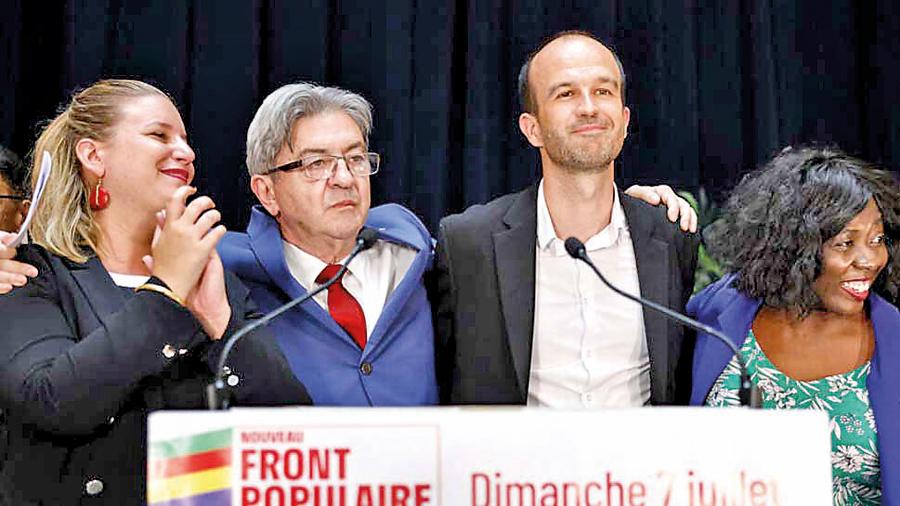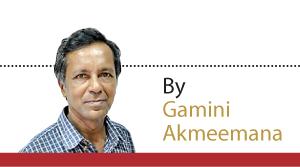Reply To:
Name - Reply Comment

Le Front Populaire, a loose alliance of left-wing parties and greens, came on top at the French election.
What a roller coaster ride it was. During recent European Union elections, France’s Rassemblement National, the
 party of far right politician Marine Le Pen, came on top. Centrist President Emmanuel Macron panicked and called for snap elections, gambling that Le Pen’s vitriolic legacy of gaffes and hardline views would cloud her sudden, meteoric rise to the top.
party of far right politician Marine Le Pen, came on top. Centrist President Emmanuel Macron panicked and called for snap elections, gambling that Le Pen’s vitriolic legacy of gaffes and hardline views would cloud her sudden, meteoric rise to the top.
It looked as if his gamble had failed. But last week, French voters proved him right, though not exactly according to the script. Le Front Populaire, a loose alliance of leftwing parties and greens, came on top. Macron, a pro-business politician who had hardly endeared himself to the average French voter, came second, and Marine Le Pen came third.
But the winner didn’t get an outright majority, resulting in a hung parliament, and the presidential elections will take place only in September. Jean-Luc Melechon, leader of the Front Populaire, has called on the government to resign. But Macron’s presidential term has not ended. His prime minister tendered his resignation, but Macron asked him to stay on.
Force to be reckoned with
It looks as if Macron will have to form an alliance with former foes to salvage his career, and Marine Le Pen is far from finished. Her party wasn’t routed – it got 37% of the vote – and is still a force to be reckoned with. Furthermore, she has formed an alliance with Hungarian leader Viktor Orban who has formed a right wing party within the EU Parliament.
But the French election result (together with Labour routing the Conservatives in England) makes me feel more optimistic about the future of Europe. This is not because the French left has surefire formulas to solve the country’s burning problems, including unemployment, economic downturn and immigration.
Malechon is described as a radical leftist and has proposed taxing the rich more, as well as recognising Palestinian statehood, which Macron refused to do months ago. Extremes, be they left or right, do not create the consensus necessary for happy nationhood. In recent years, it looked as if France’s left was a spent force. Many of Le Pen’s supporters are disgruntled former socialists.
But a new generation of French voters has clearly embraced the broader ideals of the left as the best bet for the future, and they are ready to defend their rights to the full, as demonstrated by left-wing riots which rattled French cities and suburbs in the wake of Le Pen’s EU victory.
The legacy of harbouring political refugees (famous or otherwise) led to millions more, mainly from the Middle East, Africa and Asia, seeking safety in France over the past few decades.
French voter
It remains to be seen if this left plus green coalition, if they form the next French government, can ease the burden of the average French voter. But, whatever they propose, with or without Macron, is bound to be more civilised and voter-friendly than what Le Pen’s far right has in store.
Some analysts suggest that Le Pen is held in check by France’s electoral system. In 1958, Charles de Gaulle introduced electoral changes designed to keep the far right from gaining too much power. From the 1930s to the forties, he had firsthand experience with the damage fascism did to Europe and democracy.
The rise of Le Pen and her party from relative obscurity to the top of the league in a few years should surprise no one who knows France’s 20th-century political history. The far right (going as far as fascism) has always been a significant force in French politics. Many French fascists hailed Hitler’s rise and did not oppose the German occupation of France from 1940-44 in World War II.
On the contrary, they formed a government in the South of France (the Vichy government) under Marshal Petain, collaborating fully with the Germans and actively participating in the round-up and deportation of Jews to German concentration camps.
Forced into exile by the German occupation, Gen. Charles de Gaulle led a parallel government from England. Petain, a WWI French military hero, was hanged after WWII. Gen. de Gaulle, a centrist, became French President at war’s end. This was after a political struggle with the French communists, who fought a bitter guerrilla war against German occupation. They hoped to form a post- war government, but de Gaulle won that battle.
Socialists and the centre
Since then, French politics has been a tussle between the socialists and the centre. Francois Mitterrand is perhaps the best-known socialist to lead the country, while Jacques Chirac comes to mind among centrist presidents. But this balance of power began to change two decades ago as voters became increasingly disillusioned with a succession of under-performing socialist governments.
France may have veered slightly to the right from the centre at times, but not very far. Both sides respected the time-honoured French policy of laicite – which can be loosely translated as liberal values respecting individual rights.
Liberty, equality and fraternity were the rallying cry of the French revolution. Many liberal-minded or free thinkers, as well as writers and artists, found France a haven from the time of Voltaire and Rousseau to the 20th century, to Picasso and Hemingway. Revolutionary figures as diverse as Karl Marx, Ho Chi Minh and Ayatollah Khomeini spent time in France to escape persecution at home.
That legacy of harbouring political refugees (famous or otherwise) led to millions more, mainly from the Middle East, Africa and Asia, seeking safety in France over the past few decades. The rising anti-immigrant feeling, now directed mainly towards Muslims, fuels xenophobic hate machines such as Le Pen’s party. But the sudden show of strength and unity by the French left and green parties shows us that all is not lost.
That, plus Labour’s not unexpected return to power in England, is a glimmer of hope in the increasingly dark and fractured Europe.